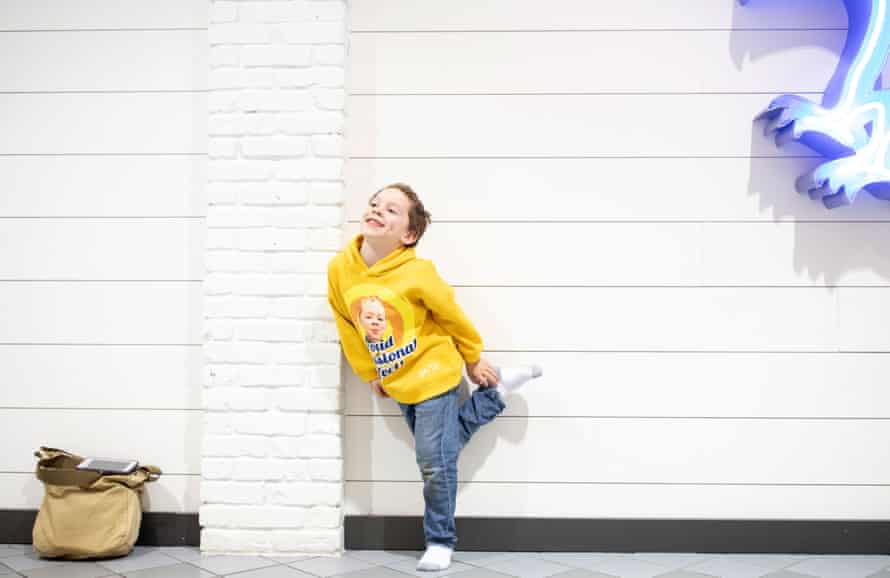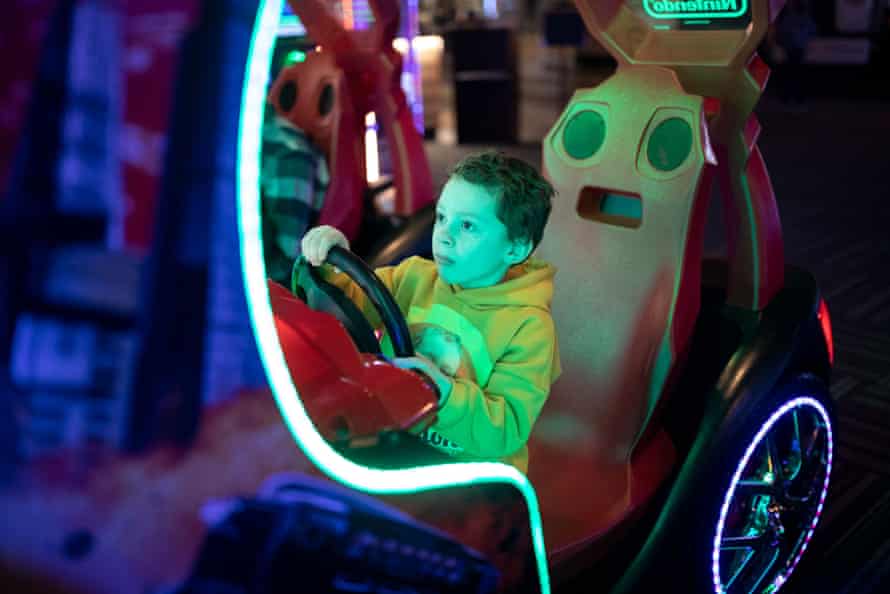Fat Black Kid Can't Get the Words Out
It was the summer of 2013 when Gavin Thomas made his breakout appearance on the internet. He was two and half.
His grandfather had just passed away after a long battle with cancer, and his extended family gathered every Sunday to share a meal. Gavin was the only grandchild, the center of attention. The adults doted over him and shared photos of his early life via a joint iCloud account.
One Sunday, Gavin's uncle, Nick Mastodon, took a video of Gavin putting stickers on his face and uploaded it to Vine, a recently launched video sharing platform. Mastodon was an early adopter and had gained a decent following making mash-ups of Disney movies and pop songs. Gavin's happy spontaneity struck a chord with Mastodon's followers, who demanded more toddler content.
Gavin's mother, Kate Thomas, gave Mastodon permission to spend 20 minutes making videos with Gavin during their Sunday visits. The format was simple: Mastodon would act, and Gavin would react. In one video, Mastodon asks Gavin: "What was your favorite part about going to the doctor today?" Gavin responds: "When I throwed up on my jacket." In another, Mastodon puts a gecko on Gavin's head and his face oscillates rapidly between anxiety and astonishment.
By 2014, Mastodon's follower count had grown to just under 1 million.
Mastodon and Kate thought the videos would be a brief internet craze and then fade into irrelevance. But then they started to notice people taking screenshots of Gavin's face to make reaction memes, such as a picture of Gavin with his arms crossed accompanied by the caption: "How ya mom be looking when you get home too late."
Soon, the Gavin meme had taken on a life of its own. The people of the internet adopted Gavin and started to refer to him as "our son".
Gavin's dad, Adam, remained mostly oblivious to his son's fame until late 2017, when one of his colleagues noticed a framed picture of Gavin on his desk.
"Oh my God, this is hilarious," he announced to the office. "Adam has a picture of the meme kid on his desk."
Confused, Adam responded that the boy in the picture was his child.
"Yeah, I get the joke," his colleague said. "He's all of our kid. He's the internet's son."
"No," Adam replied. "That's actually my child – he is my physical son."
Gavin is now eight – a second-grader from a middle-class family in Minneapolis. His astonishing online fame led to opportunities his parents never imagined possible. The trade-off is a childhood played out in front of millions of strangers, the cost of which remains to be seen.
I recently spent a weekend with Gavin, eager to learn how a seemingly normal family are dealing with the memeification of their only son.

W hen Kate picked me up from my hotel in downtown Minneapolis on a Friday afternoon, she had just collected Gavin from school. "Say hello to Oscar, Gavs," Kate said. Reluctantly, Gavin gave me a high five, and then told Kate that he wanted to play Fortnite. "My phone doesn't have enough battery," she said. "But why don't we stop off and get you some Wendy's. You're probably just a bit tired and hungry."
We were headed to the Winter Lights festival at the Arboretum, a botanical garden and function center on the outskirts of the city. Kate, who is 35, told me that her husband wouldn't be able to join us – he is in the military and was away for work.
The plan for the evening was to shoot a video of Gavin making cookies with Kate's sister, who works as head chef at the Arboretum. Over the past few months, Gavin had started making regular vlogs to keep his fans updated about his life.
Making these is part of a new content strategy developed by Gavin's manager, Byron Austen Ashley, who Kate began working with in December 2017. Previously, her strategy for managing Gavin's online following was haphazard. She had her own social media accounts where she uploaded pictures and videos of Gavin, but most Gavin content was being created by unaffiliated meme accounts, some of which were using his face to sell merchandise.
Ashley began by telling Kate to start new social media accounts on Gavin's behalf and then hire a legal team to shut down the other meme accounts. Kate's accounts now have millions of followers across multiple online platforms and far greater control over the content that gets disseminated.
At the Arboretum, Kate's sister said that she wouldn't have time to make a video with Gavin making cookies. "That's OK," Kate said, handing Gavin a digital camera attached to a small tripod. "Why don't we go outside and make a video of the lights instead."
"What people seem to love about Gav is that he's just a normal kid," Kate said. "So, we just take videos of us out and about. And then I go through the footage later and decide what to upload, just like any proud mom."
Once outside, Gavin, who had perked up since his Wendy's cheeseburger, hit record and took off into a field of snow with illuminated hay-barrels and barns, swinging the camera by his side. When I caught up, he asked if I wanted to play hide and go seek. "Sure," I said.
"OK, I'll hide first," he said. "Take the camera."
"Why do I need to take the camera?" I asked.
"Because then no one can see me."

L ast year was huge for Gavin. He travelled to China twice, headed to New York to appear on Good Morning America, and in November, he made an appearance at the premier of Ralph Breaks the Internet in Los Angeles. "That was really amazing," Kate told me. "They invited other meme kids, like David After Dentist and Side Eye Chloe and Backpack Kid, so I got to meet their families and trade stories."
I had reached out to several of these "meme kids" and their families before meeting Gavin. For most, the experience of internet fame was a meteoric, short-lived experience.
Such was the case for David Devore, better known as David After Dentist, whose dad shot a video of him while he was still high on pain medication after dental surgery when he was seven. The video went viral and Devore was briefly famous. "Now I'm a senior in high school and applying for college," he told me. "I'm just a regular kid who plays lacrosse and works out. The whole thing is just kind of like a cool memory."
But not all experiences of unwitting internet fame are so benign. The forebear of this type of celebrity was Ghyslain Raza, who in 2002, at the age of 14, filmed himself fighting imaginary sentries with a golf ball retriever in the media room at his high school. The footage was discovered by three classmates who uploaded it to Kazaa, a file-sharing network. The video was then discovered by blogger Andy Baio, who posted a copy on his popular blog, along with a remixed version that superimposed Star Wars graphics on to the footage.
For 14-year-old Raza, the non-consensual online fame was horrifying. He was mercilessly bullied, lost the few friends he had, and ended up completing his final exams at a hospital psychiatric unit. While Baio retrospectively tried to cast Raza as an "internet hero", Raza felt like the internet was laughing at him, not with him. "Having your 15 minutes of fame, when you've done something truly worthwhile, is one thing. When you earn it for something humiliating, that's entirely different," Raza said in 2013. "I couldn't help but feel worthless, like my life wasn't worth living."

Kate says she is aware of the risks involved with Gavin being so young and so exposed. Someone once superimposed a Clorox label on a picture of Gavin drinking from a mug, making reference to a morbid suicide meme. Another time, a group of teenagers drove to Kate's mother's house and made a Vine outside. Since then, the Thomas's have taken steps to ensure their privacy and Gavin's safety. They don't reveal their surname publicly ("Thomas" is an alias), never give out their address, and they have asked the school not to identify Gavin to anyone outside of the family.
"We keep a close eye on everything," Kate told me. "But mostly, our followers are very nice and often protective. It really does feel like the whole internet is looking out for him, making sure he is drinking his milk, doing his homework. It feels special to see your boy loved by so many strangers."
T he next morning, I met Gavin and Kate at the Mall of America, which has an indoor theme park, a mini-golf course, and movie cinemas. "Gav knows the social media team here," Kate told me. "They love it when he comes and hangs out, so they've given us free passes to go on all the rides."
Gavin was dressed in a yellow hoodie with a big picture of his own face on it, which would be available to buy via their new online shop in a few months.
Kate is candid about how Gavin's internet fame could lead him to a career online. If making a living as an internet celebrity was inconceivable a decade ago, it is now a profession that many aspire to. At this stage, Kate told me, Gavin wants to be a YouTube gamer. The most successful ones – Markiplier, PewDiePie, Fernanfloo – earn millions of dollars each year and have more cultural influence among young people than traditional celebrities.
To do this, Kate is taking direction from Ashley. They have enrolled him in acting classes and started teaching him how to edit video. They have also set up a Coogan account, a type of trust established in the 1930s to safeguard the money earned by child performers into adulthood.
Arden Rose, one of Ashley's other clients, got her start making beauty-focused YouTube videos on her dad's laptop when she was 14 out of their suburban Arkansas home. She accumulated a devoted following online and leveraged this to become the lead actor in two successful TV series: Mr Student Body President and Guidance. She has since designed a jewelry collection, signed big product endorsements with Calvin Klein, authored a book published by HarperCollins, and splits her time between Los Angeles and London.

Part of what makes internet celebrity so appealing is this sense of accessibility. Whereas being a movie star once required living in a certain place and having certain connections, being a YouTube star ostensibly only requires a camera and the internet.
But this democratic access to fame that the internet affords comes at a cost. Last year, a number of high-profile YouTubers talked publicly about the pressure of constant online engagement. Elle Mills, a YouTuber who rose to fame in 2017 after posting a hugely popular "coming out" video, uploaded a video to her channel in May entitled "burnt out at 19". She confessed that the grind of producing new content and the emotional labor of interacting with her fans had left her anxious and depressed.
Because Kate still runs Gavin's accounts on his behalf, his engagement with fans is carefully moderated. Yet occasionally, his celebrity spills out into the real world.
As we walked around the mall, a number of teenagers took pictures of him from a distance. At one point, Gavin dropped his packet of caramel popcorn on the ground. "Oh no! What have you done, Gavin," said a young woman walking past. "Do you think I can take a selfie with you?" Gavin, popcornless and crestfallen, shook his head. Kate whispered something in his ear. He relinquished and went to stand next to the stranger, producing one of his signature faces, which sits ambiguously between a smile and a grimace.
"That's pretty normal for us," Kate said as we made our way to the arcade. "He's been recognized in public since he was three. Here in Minnesota, people are pretty reserved and generally keep their distance.
"But in China, it was a different story."
Name: Gavin Thomas
— What's on Weibo (@WhatsOnWeibo) January 12, 2019
Age: 8
Occupation: Internet celebrity/meme icon in China
Weibo followers: 2.1 million (!)
Famous in China why: his "fake smile" speaks to people familiar with awkward social situations, hence nickname "Fake Smile Boy" #假笑男孩. Gavin's uncle is: @nickmastodon pic.twitter.com/STlHArNu6S
Gavin and Kate made their first trip to China in August 2018, after the successful launch of Gavin's Weibo account – they gained over 1 million followers in the first day. A media team from GQ China followed him around Beijing and Chengdu, taking pictures of Gavin with his fans. Gavin and Kate returned to China in September after being invited to a technology conference hosted by Tencent, the biggest social network and gaming company in the country.
This pivot to a Chinese audience started after Ashley was tipped off that Gavin's face was being used to sell mugs, posters, and clothing on Chinese e-commerce sites. Ashley's hunch, in his words, was to "lean in and capitalize".
When I spoke to Ashley over the phone, he told me that the digital entertainment industry is far more advanced in China than it is in the US. He has been working on forging a number of brand deals for Gavin, including appearing in a hair product advertisement alongside his dad.
It is this Chinese fanbase that now distinguishes Gavin from other meme kids. He is becoming less gimmick, more media personality. "There's a universe where he's the most relevant American celebrity in China," Byron told me. "Some people would say he is already."
I asked Kate what made her son so popular in China. "I think it's his face," she said. "I think there's something about it that is very relatable."
Ashley also believes that Gavin's face is his most valuable asset in China – more specifically, the signature smile/grimace face. On Chinese social media, it is used as a meme to connote forced positivity in an otherwise uncomfortable situation. For example, people will post a picture of Gavin's smile with text that reads: "I can't wait for school on Monday." So widespread is this meme that Gavin has become known by the Chinese media as "the boy with the fake smile".
"We're currently working on a strategy to protect this face," Ashley told me. "The case we're making is that the way that Gavin is shared is not so much as a person, but more as an emoji."
G avin's uncle is now working as a creative at an advertising firm – a job he got in part because of his social media presence – so he has little time to make videos with Gavin. But they're still close and Mastodon feels a sense of responsibility for how Gavin's life is now unfolding.
"I think that social media makes being a kid and a parent a lot more complicated than it used to be," he told me. "When we were kids, we used to make videos with our neighbors – I think we recreated the show Friends at one point – but this was on an old videotape recorder, and I don't even think my parents watched them." With Gavin, they have this vast record of his life online and on iCloud accounts. "I think this makes growing up a whole different experience."
In my family, my older sisters share a lot of photos and videos of their children via our family WhatsApp group. We live in different countries, so photo sharing is a good way to stay in touch. I have seen my nephews and nieces take first steps and sing the alphabet for the first time, to which I respond with heart emojis.
But my eldest sister has misgivings about putting her children on more public forums. She and her husband have a rule not to post content on social media that shows their children's face. They want their children to be able to choose how they depict themselves online, to have agency over their digital record, rather than it being forged by their parents without consultation or consent.
They also worry that if they posted content of their children, they might start analyzing their interactions with them through the lens of what gets more engagement. "If you're conditioned to feel your relationships are somehow improved by the number of likes you get, you're setting yourself up for difficult times ahead," my brother-in-law told me.
While they feel that these rules have been useful so far, they still have questions and anxieties about the future. When is the right age to let children start posting their own content? What do they do if their friends post things about them online? "These are uncharted waters," my sister told me. "And we're all just bumbling through."
Like my sister, the Thomases are navigating their way through the ramifications of sharing a Truman Show-like record of their child. But the Thomases, like many other families, have allowed the world into their private photo album. In return, they experience an intensified version of what all proud families feel when they receive praise about their children.
The trade-off for Gavin's life and how it unfolds is yet to be seen. What will growing up be like after the come down from a dopamine-rush childhood? What will be compromised in order sustain the high?
"He's only eight, but internet fame has just kind of been the norm for him his whole life," Mastodon said. "I don't think he fully understands what that means, and I don't think we do either. What I've always kept in mind is what he will think in, like, 15 years. Will he be grateful? Will he say I wish my uncle hadn't have done that? I sometimes feel like we've handed our kids a reality they didn't sign up for."
Fat Black Kid Can't Get the Words Out
Source: https://www.theguardian.com/lifeandstyle/2019/jan/28/gavin-thomas-meme-internet-son-social-media